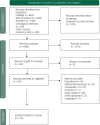Effects of the COVID-19 pandemic and previous pandemics, epidemics and economic crises on mental health: systematic review
- PMID: 36214114
- PMCID: PMC9551492
- DOI: 10.1192/bjo.2022.587
Effects of the COVID-19 pandemic and previous pandemics, epidemics and economic crises on mental health: systematic review
Abstract
Background: A rise in mental illness is expected to follow the COVID-19 pandemic, which has also been projected to lead to a deep global economic recession, further adding to risk factors.
Aims: The aim of this review was to assess the impact of the COVID-19 pandemic and previous pandemics, epidemics and economic crises on mental health.
Method: Searches were conducted in PubMed, Web of Science, PsycINFO and Sociological Abstracts. We included studies of all populations exposed to the COVID-19 pandemic, and other similar pandemics/epidemics and economic crises, compared with non-exposed time periods or regions. The outcome was mental health.
Results: The 174 included studies assessed mental health impacts of the COVID-19 pandemic (87 studies), 2008 economic crisis (84 studies) and severe acute respiratory syndrome (SARS) epidemic (three studies). Outcomes were divided into affective disorders, suicides, mental healthcare utilisation and other mental health. COVID-19 pandemic studies were of lesser quality than those for the economic crisis or SARS epidemic. Most studies for all exposures showed increases in affective disorders and other mental health problems. For economic crisis exposure, increases in mental healthcare utilisation and suicides were also found, but these findings were mixed for COVID-19 pandemic exposure. This is probably because of quarantine measures affecting help-seeking and shorter follow-ups of studies of COVID-19 pandemic exposure.
Conclusions: Our findings highlight the importance of available, accessible and sustainable mental health services. Also, socioeconomically disadvantaged populations should be particular targets of policy interventions during the COVID-19 pandemic.
Keywords: COVID-19; anxiety disorders; depressive disorders; epidemiology; suicide.
Figures




Similar articles
-
Impact of COVID-19 and other pandemics and epidemics on people with pre-existing mental disorders: a systematic review protocol and suggestions for clinical care.BMJ Open. 2020 Sep 1;10(9):e040229. doi: 10.1136/bmjopen-2020-040229. BMJ Open. 2020. PMID: 32873685 Free PMC article.
-
[Health professionals facing the coronavirus disease 2019 (COVID-19) pandemic: What are the mental health risks?].Encephale. 2020 Jun;46(3S):S73-S80. doi: 10.1016/j.encep.2020.04.008. Epub 2020 Apr 22. Encephale. 2020. PMID: 32370984 Free PMC article. French.
-
Trends in suicide rates during the COVID-19 pandemic restrictions in a major German city.Epidemiol Psychiatr Sci. 2021 Jan 19;30:e16. doi: 10.1017/S2045796021000019. Epidemiol Psychiatr Sci. 2021. PMID: 33461639 Free PMC article.
-
What We Have Learned from Two Decades of Epidemics and Pandemics: A Systematic Review and Meta-Analysis of the Psychological Burden of Frontline Healthcare Workers.Psychother Psychosom. 2021;90(3):178-190. doi: 10.1159/000513733. Epub 2021 Feb 1. Psychother Psychosom. 2021. PMID: 33524983 Free PMC article.
-
Alcohol Use and COVID-19: Can we Predict the Impact of the Pandemic on Alcohol Use Based on the Previous Crises in the 21st Century? A Brief Review.Front Psychiatry. 2020 Dec 18;11:581113. doi: 10.3389/fpsyt.2020.581113. eCollection 2020. Front Psychiatry. 2020. PMID: 33391048 Free PMC article. Review.
Cited by
-
Follow-up of telemedicine mental health interventions amid COVID-19 pandemic.Sci Rep. 2024 Jun 28;14(1):14921. doi: 10.1038/s41598-024-65382-w. Sci Rep. 2024. PMID: 38942891 Free PMC article.
-
Interventions to Foster Mental Health and Reintegration in Individuals Who Are Unemployed: Systematic Review.JMIR Public Health Surveill. 2025 May 5;11:e65698. doi: 10.2196/65698. JMIR Public Health Surveill. 2025. PMID: 40324176 Free PMC article. Review.
-
Effect of Nucleic Acid Screening Measures on COVID-19 Transmission in Cities of Different Scales and Assessment of Related Testing Resource Demands-Evidence from China.Int J Environ Res Public Health. 2022 Oct 16;19(20):13343. doi: 10.3390/ijerph192013343. Int J Environ Res Public Health. 2022. PMID: 36293923 Free PMC article.
-
Validation of a machine learning model for indirect screening of suicidal ideation in the general population.Sci Rep. 2025 Feb 24;15(1):6579. doi: 10.1038/s41598-025-90718-5. Sci Rep. 2025. PMID: 39994320 Free PMC article.
-
The Mental Health Impacts of a Pandemic: A Multiaxial Conceptual Model for COVID-19.Behav Sci (Basel). 2023 Nov 8;13(11):912. doi: 10.3390/bs13110912. Behav Sci (Basel). 2023. PMID: 37998659 Free PMC article.
References
-
- World Health Organization (WHO). COVID-19 Disrupting Mental Health Services in Most Countries, WHO Survey. WHO, 2021. (https://www.who.int/news/item/05-10-2020-covid-19-disrupting-mental-heal...).
-
- World Bank. Global Economic Prospects, June 2020. World Bank, 2020.
Publication types
Grants and funding
LinkOut - more resources
Full Text Sources
Miscellaneous

